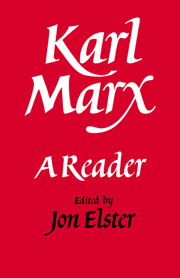VIII - The Marxist Critique of Ideology
Published online by Cambridge University Press: 05 June 2012
Summary
Ideologies, in the Marxist traditions, are views, ideas, or beliefs that are somehow tainted by the social origin or the social interests of those who hold them. Like Freud after him, but in a very different manner, Marx was challenged to go beyond the manifest content of beliefs to seek for a noncognitive explanation. Selection 30 offers an early application of this method to religious belief. Selection 31 contains Marx's most explicit statement on the nature and origin of ideology. Selection 32 offers some observations on the role of ideologies in political life. Selection 33 shows how Marx read the history of economic thought with a view to bring out its ideological character.
FROM CONTRIBUTION TO THE CRITIQUE OF HEGEL'S PHILOSOPHY OF LAW. INTRODUCTION
The following passage is the opening statement of this early (1844) work, which concludes with the identification of the proletariat as the only agent that can carry out the revolutionary transformation of society Marx is calling for.
For Germany the criticism of religion is in the main complete, and criticism of religion is the premise of all criticism.
The profane existence of error is discredited after its heavenly oratio pro aris et focis has been disproved. Man, who looked for a superhuman being in the fantastic reality of heaven and found nothing there but the reflection of himself, will no longer be disposed to find but the semblance of himself, only an inhuman being, where he seeks and must seek his true reality.
- Type
- Chapter
- Information
- Karl MarxA Reader, pp. 299 - 332Publisher: Cambridge University PressPrint publication year: 1986



